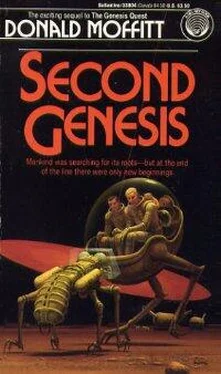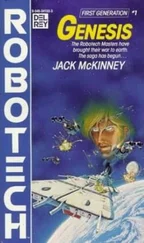Bram snatched at another straw. “The inverse-square law! By the time the shells of radiation reach the outskirts of the galaxy—”
“They’ll still be fatal,” Jun Davd said flatly. “In any case, no life anywhere in the galaxy will be able to survive the final event, when the two black holes merge.”
A stunned silence pervaded the bridge. Everybody had been listening, of course—trying not to let it all sink in, taking refuge in Jun Davd’s lucid exposition, clinging to some last atom of hope that out of his calm parade of revelations would come the one final fact that was a reprieve for the Father World and its two races.
Now people avoided looking at one another, as if in some obscure shame.
Out of the silence came a strange sound—one that became a shocking sound a moment later as people on the bridge realized that it was the sound of Jun Davd sobbing.
Bram shocked them further by putting the question that sooner or later would have to be asked.
“Will Yggdrasil survive?”
Jun Davd needed a moment to regain control of his voice, “We are now disposing of more energy than is available to the entire Nar civilization. The fields are still holding. We are protected for the time being. But I don’t know if we can handle something on the scale of a climactic merger of the primary hole and its satellite.”
There was a delayed moan of grief from someone on the bridge. Grief for the loss of the Nar and all their works. These were superb people, Bram’s racing mind said. Personal fear would come later.
Jun Davd took refuge in more pedantry. “When two black holes become one, the resulting event horizon has a greater area than the sum of the areas of the event horizons of the original holes. It does not attain its final shape immediately. During the fraction of a second when the collapse takes place, there is a shifting and complicated topography. The geometry of space-time around it is … irregular. The mathematics to describe it does not exist. And the … distorted … event horizon vibrates. The gravity waves generated by two vibrating masses equivalent to a billion and a half suns will be tremendous. What that will do to the surrounding plasma, you can well imagine. Next, angular momentum will increase abruptly at the same time that queer event horizon expands—and because the conjugate hole is spinning rapidly, the accretion disk will be embedded well below the static limit, transferring mechanical energy and magnetic force. A tremendous explosion of gamma radiation will travel outward at the speed of light, followed by a sphere of stripped matter traveling at relativistic speeds. We can hope to outrun the matter. But our ability to survive the shell of radiation may depend on our distance from the core when it overtakes us.”
There was one last question for Bram to ask.
“How soon before the holes merge?”
“We’ll be lucky to make it around the core.”
“We’re making a run for it, anyway,” Jao said.
“That we are,” Bram agreed. “All we can do is to pour on the gravities.”
He lay propped on the floor pad, feeling the oppressive weight on his chest, his shoulders, his neck as he tried to hold his head up. All down the length of the observation loggia, dozens of people lay similarly sprawled on pads, working prone, their instruments on the floor beside them. Bram had ordered everybody to crawl, not walk, if they absolutely had to move about. The bulk of the population of the tree were in their quarters, lying down. It was still half a day till periastron, and they would remain there until then.
Jao said, “No, that’s not all we can do. Bram, I’ve got to ask you about something.”
“Ask away.”
“There’s a decision to make about the core maneuver.”
“Why ask me ? I’m only year-captain. Discuss it with Jun Davd.”
“I’ve already discussed it with Jun Davd. But it’s not strictly a technical decision. It involves the lives of everyone aboard. Jun Davd says you’re the only one who can make the decision, and I agree.”
With a sinking feeling, Bram said, “Go ahead.”
“We’ve got to get in and out of the galactic core fast. There’s no way we can simply back up, the laws of physics being what they are. We’ve got to use the mass at the center to bend our path in a hyperbola and swing around and out. Now our patron mass turns out to be two masses, very close together—right—but for the purposes of our hyperbolic orbit, we’re treating it as a single mass.”
“Yes,” Bram said, wondering what Jao was driving at.
“Even if there were some magical new law of physics that would let us dump all our inertia at once and come to a dead stop without rattling the glassware, it wouldn’t do us a bit of good. Because we’d have to back out from a standing start and build up all our lovely gamma factor all over again, and that would take us fifty thousand years longer than whipping around the focus of the hyperbola. So we’re committed.”
“Yes, certainly. Everyone understands that.”
Jao tried to wave a leaden hand, gave up the effort. “We also have to add a vector to angle the outward path somewhat above the plane of the galaxy if we want to aim at the Milky Way. That makes it even more tricky, but I won’t go into that now.”
“Yes, yes,” Bram said, wishing Jao would get to the point.
“So, as you said, we decided to pile on all the acceleration that Yggdrasil will bear in the hope of beating the merger of the two black holes and the final explosion by the widest margin possible. But the extra speed means we need an even tighter hyperbola—we’ve got to brush that doomsday engine ever closer, and that has its own dangers.”
“We all decided to take the risk.”
“Otherwise,” Jao said, ignoring the interruption, “we’d escape the galaxy, all right, and save our own skins. But we’d sail on out into intergalactic space and miss our target.” He looked around and lowered his voice. “Of course, there may be some who are frightened enough of the core maneuver to want to do that on purpose.”
“If you’re asking—”
“Bram, there’s a way we can pick up some extra velocity without adding more g’s and taking the risk of cracking Yggdrasil’s branches—to say nothing of our own sacroiliacs.”
“Go on.”
Jao hitched himself closer on his elbows. He took another look around the bridge to make sure that he would not be overheard.
“We use the satellite hole as a gravity machine.”
“What?”
“We’re already going to pick up the rotational energy of the primary hole. It’s got a rotation parameter of point nine nine eight, and it’s doing weird things to the space around it, and the field lines from the accretion disk are going to reach out with magnetic fingers and fling us along by our own magnetic field. Now, what I’m saying is that we can refine our orbit and loop around the satellite hole, and pick up its orbital energy. It’s whizzing around its primary at a ferocious rate at this point. We could pick up fifty thousand g’s of acceleration without it costing us a thing. We wouldn’t even feel it!”
“We’d have to fly between the two holes to make that loop.”
“Uh huh.”
“Jun Davd says they’re only a few diameters apart at this stage. And they’re spiraling closer. The final dive could happen at any moment.”
“He thinks we have enough time to squeak through.”
Bram’s heart was pounding. “He said that at the present high rate of spin, the static limit is well above the edge of the accretion disk. The region between them must be very weird. We could get sucked into the hole with no warning. Into either one of the holes.”
Читать дальше












